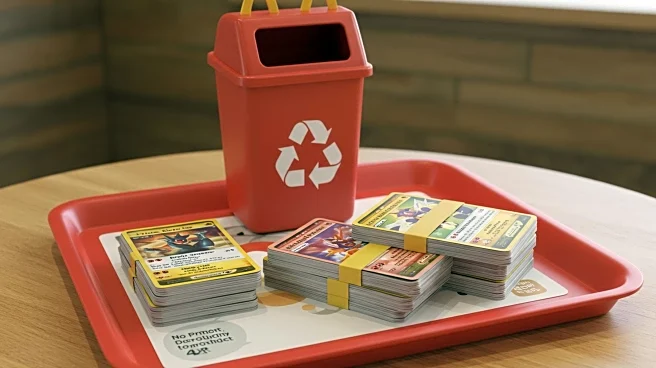What's Happening?
McDonald's has introduced new restrictions in response to scalpers purchasing large quantities of Happy Meals solely for the Pokémon cards included in them. This move comes after a recent promotion in Japan saw scalpers buying dozens of Happy Meals, leading to significant food wastage as meals were discarded uneaten. The fast-food chain quickly ran out of Pokémon cards, prompting an apology to disappointed fans. In response, McDonald's has limited the purchase to three Happy Meals per group, down from a higher per-person limit. The promotion will continue with Pokémon toys instead of cards, and the company has stated it will not tolerate purchases intended for resale or food disposal.
Why It's Important?
The restrictions highlight the challenges faced by companies in managing popular promotions that attract scalpers, leading to unintended consequences such as food waste and customer dissatisfaction. McDonald's actions aim to protect the integrity of their promotions and ensure availability for genuine customers, particularly families and young fans. This situation underscores the broader issue of scalping in retail, where high-demand items are often resold at inflated prices, impacting consumer access and brand reputation. The company's response may set a precedent for how other businesses handle similar situations, balancing promotional success with ethical considerations.
What's Next?
McDonald's will continue to monitor the situation and may adjust its sales methods based on customer and staff feedback. The company has expressed a commitment to improving its promotional strategies to prevent future issues. Stakeholders, including customers and consumer advocacy groups, may watch closely to see how effectively McDonald's enforces these new rules and whether they lead to a more equitable distribution of promotional items. The outcome could influence future marketing campaigns and the approach to handling scalping in the retail industry.
Beyond the Headlines
The incident raises ethical questions about consumer behavior and corporate responsibility in managing promotions. It also highlights the cultural significance of Pokémon as a brand that continues to drive high consumer interest and engagement. The situation may prompt discussions on sustainable practices in promotional marketing, particularly in reducing waste and ensuring fair access to limited-edition items.











